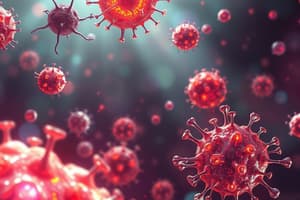Podcast
Questions and Answers
What was the objective of the study regarding T-shirts and MHC?
What was the objective of the study regarding T-shirts and MHC?
- To determine the effects of T-shirt fabric on human attraction
- To investigate how MHC influences human mate choice (correct)
- To assess the physical condition of participants while wearing T-shirts
- To evaluate the impact of different colors on T-shirt preferences
How did women perceive male body odors in relation to their own MHC?
How did women perceive male body odors in relation to their own MHC?
- More pleasant when different from their own MHC (correct)
- Less pleasant regardless of MHC similarity
- More pleasant when similar to their own MHC
- Equally pleasant regardless of MHC similarity
What effect did oral contraceptives have on women's odor assessment?
What effect did oral contraceptives have on women's odor assessment?
- Increased the accuracy of their odor scoring
- Reversed their assessment of odor pleasantness (correct)
- Made them indifferent to any odor
- Enhanced their ability to distinguish between odors
What aspect of the study design minimized demand characteristics?
What aspect of the study design minimized demand characteristics?
What criticism was directed towards the theory proposed by the study?
What criticism was directed towards the theory proposed by the study?
What was one area identified for further research beyond initial attraction?
What was one area identified for further research beyond initial attraction?
Which of the following was part of the study's ethical considerations?
Which of the following was part of the study's ethical considerations?
What potential implications did the study's findings have on reproductive health?
What potential implications did the study's findings have on reproductive health?
What is the primary function of the Major Histocompatibility Complex (MHC)?
What is the primary function of the Major Histocompatibility Complex (MHC)?
How are MHC genes inherited from parents?
How are MHC genes inherited from parents?
What was the main aim of Wedekind's 1995 study?
What was the main aim of Wedekind's 1995 study?
What role did menstrual cycle timing play in the experiment's procedure?
What role did menstrual cycle timing play in the experiment's procedure?
Which of the following was NOT a requirement for participants before wearing the t-shirts?
Which of the following was NOT a requirement for participants before wearing the t-shirts?
What was observed about couples suffering from repeated miscarriages in relation to their MHC?
What was observed about couples suffering from repeated miscarriages in relation to their MHC?
What effect did MHC detection have on a woman's mate selection, according to the research?
What effect did MHC detection have on a woman's mate selection, according to the research?
What precaution did women take prior to the study related to their nasal capabilities?
What precaution did women take prior to the study related to their nasal capabilities?
Flashcards are hidden until you start studying
Study Notes
MHC and Mate Selection
- MHC (Major Histocompatibility Complex) is a group of genes vital to the immune system.
- MHC genes create molecules that help the immune system identify pathogens.
- The greater diversity of MHC genes in parents leads to a stronger immune system in offspring.
- MHC genes are co-dominantly expressed, meaning both parents contribute equally to the offspring's MHC profile.
Wedekind (1995) Study
- Aim: To explore the influence of MHC on mate selection.
- Procedure: A double-blind experiment involving 49 female and 44 male university students.
- Participants' MHC profiles were determined, with diverse MHC representation.
- Men wore T-shirts for two nights, stored in sealed bags during the day, instructed to avoid perfumes, deodorants, alcohol, and smoking.
- Women ranked the scent of seven T-shirts: three from men with similar MHC, three from men with dissimilar MHC, and one unworn control.
- Women were tested during the second week after menstruation due to heightened odor sensitivity.
- Women rated the intensity, pleasantness, and sexiness of the scents.
- Findings: Women rated scents from men with dissimilar MHC as more pleasant. This effect was reversed in women taking oral contraceptives.
Implications and Limitations
- The study suggests a potential evolutionary basis for mate selection in humans, supporting the idea of MHC influencing odor preference.
- The study has been successfully replicated.
- The double-blind design minimizes demand characteristics.
- The study adhered to ethical standards, including consent and debriefing.
- However, the sample might not be representative due to its age and cultural homogeneity.
- Critics argue the theory is reductionist, oversimplifying human mate selection by overlooking cognitive and sociocultural factors.
- Further research is needed to clarify the role of MHC in long-term relationship dynamics and its overall impact on relationship satisfaction and stability.
Ronay and von Hippel (2010)
- Aim: Investigate the influence of evolutionary factors on male skateboarding behavior.
- Aim: Determine if men take greater risks in the presence of attractive females compared to males.
- Aim: Examine the potential role of testosterone in this behavior.
Studying That Suits You
Use AI to generate personalized quizzes and flashcards to suit your learning preferences.




